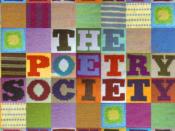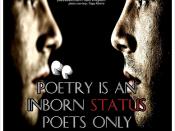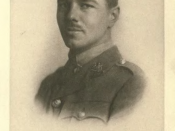Wilfred Owen portrays the horror of war by using dramatic contrasts, powerful imagery, devastating irony and by generating a strong feeling of sympathy for the subject of the poem.
The contrasts between health and illness feature heavily in the poem and give a before and after picture of the subjects life. Before the war the boy in the poem had played football,
"After the matches." "It was after football"
and now he does not even have the equipment to play, i.e. legs,
"Legless, sewn short at the elbow."
There is also a contrast used in describing age,
"younger than his youth" and "he is old."
This is an example of juxtaposition as these lines are one immediately after the other. As well as this Owen shows how attitudes towards the subject have changed,
"girls glanced", "lover" and "womens eyes passed from him"
This shows that the women who had once admired him now only looked at him with pity and, "touch him like some queer disease."
Blood is used in a graphic contrast in the third stanza,
"Hes lost his colour far from here."
"A leap of purple spurted from his thigh."
These lines give you a real image of how horrific military injures could be and the irony that the subject of the poem had once, "liked a blood smear down his leg" becomes extremely depressing.
There are examples of contrasts between the moods of people pre and post war. It is shown that before the war people were happier,
"Voices of play and pleasure,"
but now there is a more solemn atmosphere,
"Voices of boys rang saddening like a hymn."
This line also has connotations of a funeral.
The poem shows that before the war the subject would have been out with his friends just now,
"About this time Town used to swing so gay ."
However now he is unable to go out with friends,
"waiting for dark."
The character in the poem is well built up and you are given an insight into his life and attitudes both before and after the war. The poem shows that the subject was not particularly passionate about the reasons for the war,
"Germans he scarcely thought of; all their guilt And Austria s, did not move him,"
but show his reasons for joining the army, "to please his Meg." This displays the characters naivety and lack awareness of what fighting in the war entailed.
It is shown in the poem that the boy was deceived by the illusions of grandeur created.
"Of smart salutes, Esprit de corps" and "He was drafted out with drums and cheers."
This role of the hero is almost reversed after the war,
"Some cheered him home, but not as crowds cheer Goal."
He is only aware of what he had let himself in for after he was in the midst of the fighting.
"Poured it down shell-holes till the veins ran dry."
The subject appears to have been under the influence of alcohol when he joined,
"when he'd drunk a peg, He thought he'd better join."
Not only that but it seems that he was under age,
"smiling they wrote his lie; aged nineteen years."
This shows his physical youth and also his intellectual youth, in that he made such an enormous decision whilst not being in the best frame of mind.
You are given the impression that the boy took pride in his appearance and dress,
"Someone had said he'd look a god in kilts,"
And is something of a show -off,
"One time he liked a blood smear down his leg" "carried shoulder high."
The character now shows feelings of regret and loss,
"Now he will never feel how slim Girls waists are, or how warm their subtle hands,
half his lifetime lost in that hot race,
He thought he'd better join - He wonders why."
Relationships are also important in the portrayal of the effects of war. There is a strong onus on relationships with women in this poem, mainly of potential partners. There is however, one mention of a mother,
"mothering him from them"
This could mean that his mother was the only female contact he had now.
There is a suggestion of a girlfriend figure in the poem, his Meg , who he describes as the reason for him going to war. She was obviously an important figure in his life pre-war but does not seem to be prominent now he is disabled.
His main relationship now seems to be with a priest or other such religious figure,
"Only a solemn man" "inquired about his sole."
However he is completely dependant on the aid and assistance of others,
"Why don t they come And put him to bed."
Imagery is the main tool used to create sympathy for the disabled young man. In the first line the initial bout of sympathy is created,
"He sat in a wheeled chair, waiting for dark."
This is continued in the next line,
"And shivered in his ghastly suit of grey."
The last stanza creates an enormous sense of pity for the isolated and monotonous life that the subject now has to endure because of his heroics,
"Now, he will spend a few sick years in institutes" "And take whatever pity they may dole."
The last two lines hint in the direction of desperation and the wanting of death,
"How cold and late it is! Why don t they come and put him to bed? Why don t they come?"
The they mentioned could be the care home workers or more morbidly, the messengers of death.
This poem is moving and saddening. It uses stark contrasts to show how deeply a war can affect those who take part and graphic imagery to give insight into the reality of war. The illusions of grandeur alluded to in the poem are completely contradicted with the descriptions of the real events. This poem shows the horror of war with all the raw and unrestrained emotion of someone who has experienced the events themselves.


